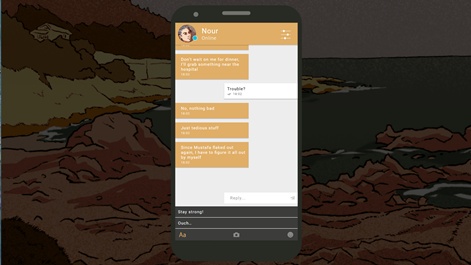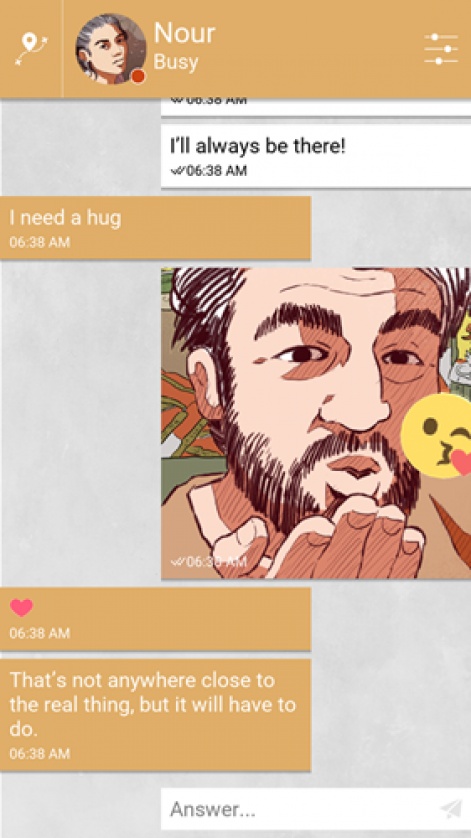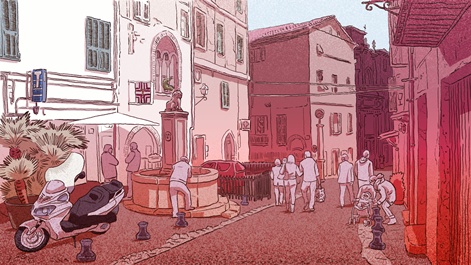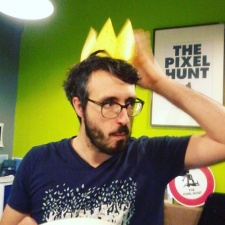Back in December 2015 French daily newspaper Le Monde published a WhatsApp group conversation detailing the journey of Syrian asylum seekers Dash and Kholio and their personal odyssey from Damascus to Germany to find the former's brother, Nash.
The group was titled 'journey to asylum' and was primarily intended to maintain high spirits, comradery and to provide family members with some piece of mind that the two were safe and well.
Their journey would quickly take on a new name as Dash’s mother would part with the phrase 'bury me, my love' in the opening exchanges of the group. While haunting and beautiful the phrase is a traditional Arabic saying that means I love you, so I want to die before you.
The intimate look into the life of asylum seekers that the article provided wouldn’t be out of place as the basis of inspiration for a Hollywood blockbuster or a documentary. Yet, the story unfolded in Pixel Hunt’s premium text-based game “Bury me, my Love” to critical aplomb.
So for this week’s edition of the Indie Spotlight, we caught up with Florent Maurin, the CEO of Pixel Hunt, the developer behind the game, to talk about life, work and his first foray into the mobile market.
PocketGamer. Biz: Can you tell us a bit about yourself?
Florent Maurin: My name is Florent Maurin and I’m 37. I live in a very, very small village in southern Burgundy, France. I have a fiancée, she rocks, two daughters, they rock, and two cats. They suck a little, but we still love them even though they’re not technically ours – just stray cats that won’t leave us alone until we feed them every morning.
How did you get started as an indie games developer?
I used to be a journalist, but in 2013 I quit in order to create a video games studio called The Pixel Hunt. I wasn’t totally turning my back on the press, though, as my ambition was to make reality-inspired games. Games with a focus on true events and, more broadly, games that say something about the world we live in.
My ambition was to make reality-inspired games. Games with a focus on true events and, more broadly, games that say something about the world we live in.Florent Maurin
In the beginning, we were doing games for clients – mostly for documentary film production companies that wanted to pair their movies with interactive programmes on the web.
We still do that but in parallel we started working on our first project as an indie games studio, Bury me, my Love, which came out last October.
What have been the biggest challenges you've faced so far?
Well, producing Bury me, my Love has been an enormous challenge from start to finish. It was our first real game, we had no experience of comparable scale, there were so many things we were learning while doing and on top of all that, we had to be super cautious not to disrespect our topic.
Bury me, my Love tells the story of a Syrian woman as she tries to reach Europe in hope of a better life. You just can’t write a game like that light-heartedly. We gathered so much documentation, read so many testimonies. We simply didn’t want to blow it.
Luckily, we were helped by Dana, a young Syrian woman who’s now living in Germany and who accepted to consult with us in order to help us write the most realistic an believable story possible.
Bury me, my Love has been a real hit on the award circuit, what has that been like?
It’s been great, of course! When your first game is competing in award ceremonies such as The Game Awards, the GDC Awards, the IMGA or even the BAFTAs, that’s a real blast! But I’m particularly happy for two reasons.
One: it’s great for the team. Everybody’s been working super hard on BMML, and I’ve tried to tell them how much I appreciated that, but I think praises are more powerful when they come from outside – particularly when it’s from seasoned professionals.
And two: it’s great because the topic is very important to me. As much as I love fun and entertaining games – and I love them a lot – I also think games as a medium can explore other territories. The so-called migrants “crisis” has been all over the news in Europe for more than five years now, but more often than not the situation is reported in terms that do not take the human factor in consideration.
We fail to grasp a simple fact: behind each migrant we see, there’s a whole lot of people who care and worry.Florent Maurin
We discuss figures (how many migrants are there? How many is each European country going to grant asylum to?) and get struck by decontextualised images (migrants piling up at a border, shown as a faceless mass), but we fail to grasp a simple fact: behind each migrant we see, there’s a whole lot of people who care and worry.
We chose to make a game about exactly that, because we were moved by the stories we had read, and because we thought video games were the most powerful tool we had to render that part of the reality. Getting awards for our work leads us to believe we were right.
The content of Bury me, my Love wouldn’t be out of place in a movie or a documentary, so what was it about mobile that worked so well with the story you wanted to tell?
I think that’s the real-time aspect. Nowadays, everyone keeps their phone with them at all times. It’s the first thing we look at in the morning and the last before we go to bed. It’s also very intimate, full of pictures we’re fond of and secrets we shared via text messages.
But more than anything, it’s the perfect tool to stay in touch with our loved ones at any moment, as long as they’re online. That’s probably why Nour, Bury me, my Love’s main character, feels real. She isn’t as disposable as most game characters. She’s got a lot on her plate, so you’ll spend a lot of time waiting to get news from her.
Did she find a place to sleep? Did she reach her destination safely? Those lights she told you she saw before she abruptly went mute, what were they? As you wait for your phone to vibrate with a new notification, you make up scenarios in your head and thus get a glimpse at what it’s actually like to worry about a migrating friend.
I think this feeling is something we would not have been able to generate with any other art form than a mobile game.

What is a typical day in your life as an indie?
To answer that, I first must confess something. I can’t code and I can’t draw. But contrary to conventional wisdom, that does not keep me from making games. It’s just that I take care of specific tasks – not always the most well-known or valued ones.
I spend time looking for funding opportunities, planning production, building game budgets in Excel, thinking about communication strategies and media partnerships. Some people find those things terribly boring but I personally enjoy it. As I like to put it, I’m the guy that makes thing possible – there are worse occupations in life.
I work mostly from home, so I get to organise my time the way I want. When I find the courage – that doesn’t happen as much as I’d like to – I start my day with a run in the countryside around my house.
Then I tend to work on creative tasks such as game design in the morning because I feel that’s when my brain is most fit for it. Before lunch I spend some time answering emails – I also often do that after dinner. And the afternoon is dedicated to production/administrative tasks.
But to be honest, all this is in theory, as my ideal routine is frequently blown up by unforeseen events.
What are your current plans for the future?
I am currently working on a new project. It’s still in its infancy, but I must say I’m pretty pumped up and very curious to see where this will go.
It’ll still be a reality-inspired game, but this time, it’ll focus on a more mundane, less news-worthy story. There isn’t much more I can say about it now, except that this time, it won’t be a mobile game. Hope you guys will play it anyways!

What is your opinion of the mobile games market for indies right now?
Well, I don’t know much about the free-to-play market – I’ve read things about how much money is generated there and it looks very impressive, but I’m pretty sure I’d be 100 per cent unable to design a game based on this business model.
On the other hand, the premium games market is really, really tough nowadays. Or maybe it’s that I make games that not a lot of people would fancy playing? I perfectly get that for the vast majority of players mobile games are a path to quick fun, and maybe also a way to escape their everyday life, with all its tensions and frustrations.
That’s where creation lies: in unconventional unions. Don’t forget to add a personal touch, preferably something that doesn’t come from video games at all.Florent Maurin
But if you’re looking for escapism, you’re probably not going to buy a game about a Syrian migrant, right? To be honest, that doesn’t bother me.
The way I see it, it’s comparable to cinema. Superhero movies are the top-grossing players in this game, but that doesn't mean there should be no documentaries, even though it's super tough for a documentary to appeal to a wide audience.
If you had an unlimited budget, what game would you most like to make?
Wow, that’s a tough one. Actually, I’m too old and to busy with my kids now to really want to make one of those huge, time-consuming blockbusters such as Skyrim or Overwatch.
I’d much rather make a game I’d enjoy playing myself: something short, narrative-heavy and intense; A game I’d still think about years later, because of its thematic, its characters and the perfect match between its gameplay and its meaning.
Now I don’t exactly know what this game would be, but I know two things: there would be a lot of voice acting because when it’s done right, it’s unbelievably great – think Oxenfree or Firewatch, and the music would be by Nils Frahm.
If you’re lucky enough not to know him yet, go check his 2015 Montreux Jazz Festival show on YouTube.
What advice would you give to other developers on "making it" as an indie?
If you’re thinking: “I love X so much I want to make a game just like that, but with a small gameplay twist that’ll make it even better”, please think again.

Don’t get me wrong: pillaging other game devs’ work is great. I think no idea ever stems out of nowhere, and to me, stealing, uh, I mean, borrowing from influences you like is something you definitely should do.
But don’t just stop there. You’re not here to iterate on someone else’s project; you have to come up with your own. And to do that, you’ll probably have to mix several influences, even if – particularly if - they don’t seem related at first.
That’s where creation lies: in unconventional unions. Thus, don’t forget to add a personal touch, preferably something that doesn’t come from video games at all.
Do a game that you’ll love because you’ll love what it’s about, be it music, cooking, rocket engineering or the art of never, ever losing an argument with a drunk, stubborn, left-handed friend you had not seen in years but bump into at the local coffee shop. In other words: learn from others, make your game.
Get the latest news, interviews and in-depth analysis on Twitter, Facebook and our daily newsletter.






















